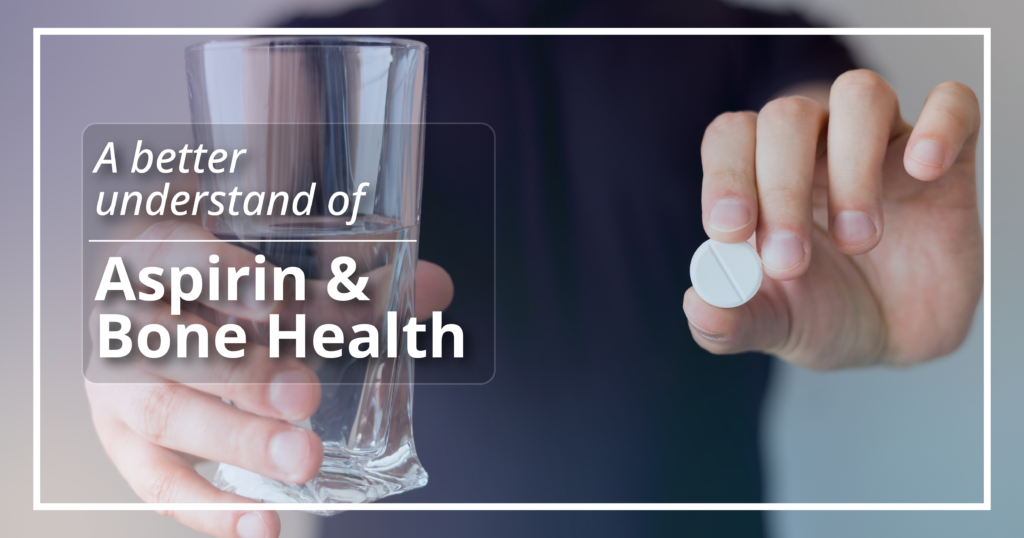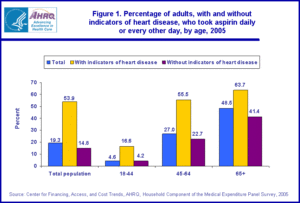
A better understanding of Aspirin and Bone Health
INTRODUCTION
Over-the-counter medicines are medicines that can be bought from a drugstore without a prescription and one of the most common over-the-counter medicines used all over the world is Aspirin. This medicine available worldwide belongs to the class of NSAIDs (Non-Steroid Anti-Inflammatory Drugs), being the first one to be discovered in this particular class of drugs.
ASPIRIN
As the name suggests, these drugs are not steroids but have similar treatment properties like them. But unlike steroids, the side effects of such drugs are very low, often having little to no effects even in long-term usage. Usually, there are two types of aspirins taken, one being prescription aspirin and the other non-prescription aspirin. Prescription aspirin, an extended-release tablet is taken about 2-3 times a day, usually to treat arthritis- rheumatoid and osteoarthritis. Non-prescription aspirin, a delayed-release tablet, is taken once a day.
Aspirin, also known by its chemical name Acetylsalicylic Acid, is used to treat a broad variety of symptoms. It is one of the first drugs to be extracted from salicylic acid-rich willow barks. Even though willow teas- prepared from willow barks have been used since ancient times to treat fevers and inflammations, it was first prepared commercially in the second half of the 19th century. Since then, it has been one of the most sought-after medicines to cure many symptoms. A few of them are:
- Fevers
- Headaches
- Body pain including pain due to cramps, bloating, irritation of the skin
- Sprains
- Inflammation
USAGE OF ASPIRIN
It is also used by patients who are recovering from heart attack and stroke, as a kind of preventive medicine to decrease the risk of another attack or stroke. This is done by reducing the stickiness of the platelets, thus reducing the probability of a clot. Even then, there have been cases where the risk of gastrointestinal bleeding and ulcerations has been common among people who have a habit of taking low-dose aspirin every day. Also, for patients taking aspirin almost daily, there are serious risks of grievous injuries even due to minor falls as the blood thinning occurs due to the drug’s regular consumption, leading to frequent medical attention.
ASPIRIN AND BONE HEALTH
A research paper published by K Y Chin in the Journal of Osteoporosis reveals that increased use of aspirin leads to bone protective effects in animals. Also, it is found that aspirin may cause an increase in the mineral density of bones, but it does not necessarily guarantee the prevention of fractures.
Even then, there was another observational study that indicated that the reduction in fracture risk was around 17%. But even then, this could not be taken as substantial evidence as the study is purely observational, meaning that the reduced risk of fracture and aspirin usage cannot be directly linked with each other.
A study published by the University of California in 2008 reveals how aspirin helps prevent the serious onset of osteoporosis- the disease in which bone loss occurs too fast or when bone replacement occurs too slowly. The experiment conducted on mice reveals two linkages. One is how it prevents incomplete bone resorption and the other is how it helps prevent bone stem cells, which are responsible for bone density in our body.
Although these experiments were conducted in rats or limited trial groups, there has been no conclusive evidence that directly links aspirin usage to an increase in bone health. Only after further studies in the upcoming years, a firm link can be established.
RISKS ASSOCIATED WITH ASPIRIN USAGE
There are also several risks associated with increased usage of aspirin namely an enhanced risk of bleeding-related disorders namely hemophilia, asthma, peptic ulcers, and even chances of liver diseases. Including a risk of high blood pressure levels.
Also, aspirin is not recommended for people below 18 as the children who use it have a higher chance of being affected by Reye’s syndrome, which exhibits symptoms ranging from cold, fever, and chickenpox. In serious cases, it can even lead to brain damage and death.
ASPIRIN USAGE TRENDS

Source: https://meps.ahrq.gov/data_files/publications/st179/stat179.shtml
Aspirin usage is seen to increase with age, with over half of the population of senior citizens with heart disease taking it daily. Even though aspirin is seen to show clear evidence regarding reduction in blood clotting, it is never advisable to take the drug without a proper prescription as there are always chances of the pros outweighing the cons, especially in the case of preventive medicines.